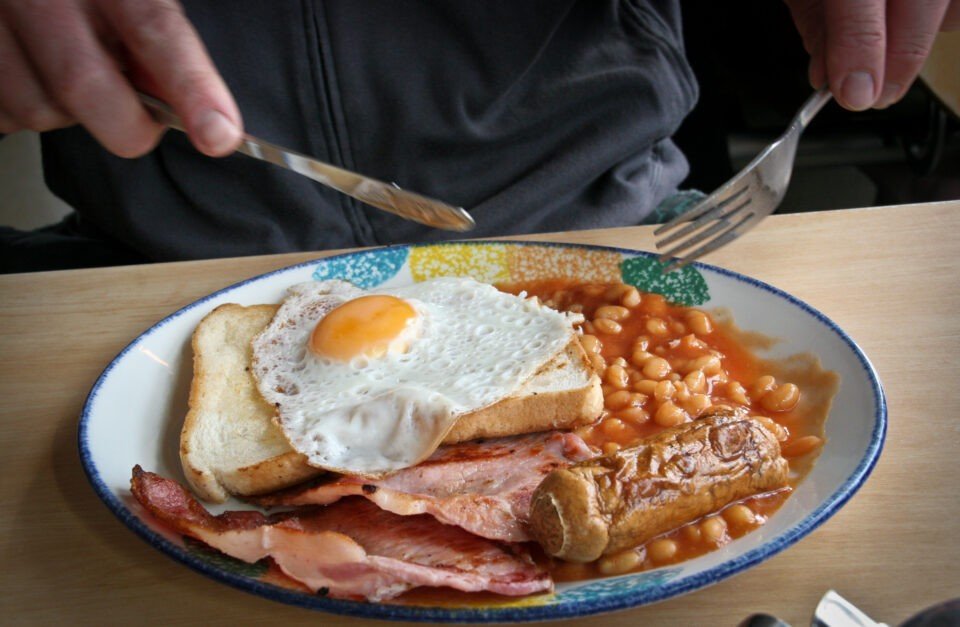WE all have our hangover tricks, from “hair of the dog” to a pint of water before bed.
But some may be doing more harm than good, and leave you in the pits of despair for longer than you need to be.
As the festive season is in full swing, albeit dampened by Covid, there are bound to be hangovers on the cards.
If there was a “cure” to the dreaded headache, nausea, and sleepiness, we’d know about it by now.
Doctors at Spire Healthcare told Luxurious Magazine there are “lots of hangover myths”.
Many Brits turn to the deliciousness of bacon, sausages and eggs to lift them out of a hangover slump.
However, due to how difficult it is to digest these foods, experts said this may make you feel more sluggish.
They said: “Avoid foods that will be harder for your body to digest, e.g. dairy products, refined sugar and fatty meat.”
These foods may also be higher in salt, which can worsen dehydration caused by a hangover.
Coffee, deep fried, salty or more alcohol will further exacerbate the symptoms of a hangover.
However, some experts disagree and say science supports that cafe stop for a bacon buttie.
Sally Adams, a lecturer in health psychology at the University of Bath, wrote in The Conversation: “Perhaps one of the most traditional remedies for a hangover is a plate of greasy bacon and eggs.
“Foods such as bacon, eggs and even broccoli contain an amino acid called cysteine, which scientists claim can decrease the amount of the toxic chemical acetaldehyde, which is produced as your body metabolises alcohol.
“Acetaldehyde contributes to hangover symptoms such as increased heart rate, nausea and vomiting.”
But she added there is “very limited research supporting the benefits of certain foods as hangover cures”.
HYDRATE
What’s clear is you’ll want to hydrate your body as much as possible with foods like vegetables, soups and broths.
Water and electrolytes, including sodium, potassium, magnesium, and calcium, are also essential.
Electrolytes balance hydration levels in the body. But when we drink alcohol, they can deplete, causing us to suffer headaches, fatigue and more.
“You can usually replace any lost electrolytes easily through food,” the experts at Spire Healthcare said.
“Bananas are a good source of potassium, and avocados, nuts and sweet potatoes are a good source of magnesium.”
If you’ve been vomiting or had diarrhoea after boozing, you might want to consider a “low-sugar electrolyte drink” – like sports drinks.
SLOW DOWN
Some say “you’re not hungover if you’re still drunk” while chucking back another prosecco.
Hair of the dog, while effective for a short period, won’t work forever. At some point, you’re going to come crashing down.
The Spire Healthcare docs said you must wait “at least 48 hours before drinking again to give your body time to recover”.
The NHS agrees that “drinking in the morning is a risky habit, and you may simply be delaying the appearance of symptoms until the extra alcohol wears off”.
But the experts said it was one of the most commonly used hangover tip that is the least likely to work – a glass of water before bed.
They said: “Perhaps the biggest [myth] is that drinking lots of water can prevent or cure a hangover.
“This isn’t true as the rate at which your body clears the toxins produced by drinking alcohol – which is what causes your hangover – can’t be changed.”
While water will help to hydrate you during a rough hungover day, it won’t stop a hangover from occurring, they said.
However, the NHS disagrees and says: “Dealing with a hangover involves rehydrating your body to help you deal with the painful symptoms.
“The best time to rehydrate is before going to sleep after a drinking session.”
The health service gives the following tips “to avoid a hangover”.
- Do not drink more than you know your body can cope with. If you’re not sure how much that is, be careful.
- Do not drink on an empty stomach. Before you start drinking, have a meal that includes carbohydrates (such as pasta or rice) or fats. The food will help to slow down your body’s absorption of alcohol.
- Do not drink dark coloured drinks if you’ve found you’re sensitive to them. They contain natural chemicals called congeners, which irritate blood vessels and tissue in the brain and can make a hangover worse.
- Drink water or non-fizzy soft drinks in between each alcoholic drink. Fizzy drinks speed up the absorption of alcohol into your body.
- Drink a pint or so of water before you go to sleep. Keep a glass of water by your bed to sip if you wake up during the night.
- pattaay it





